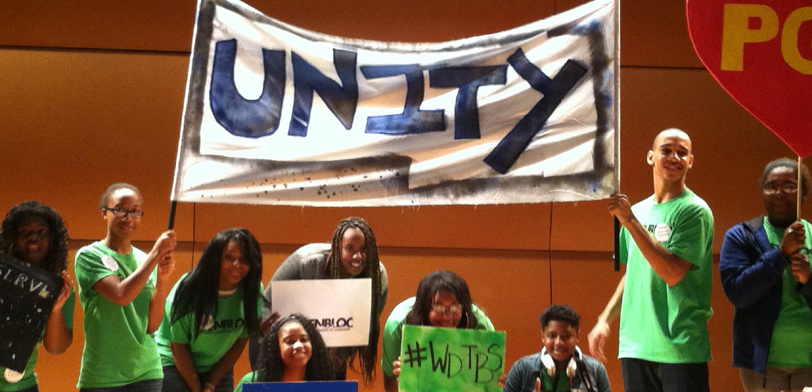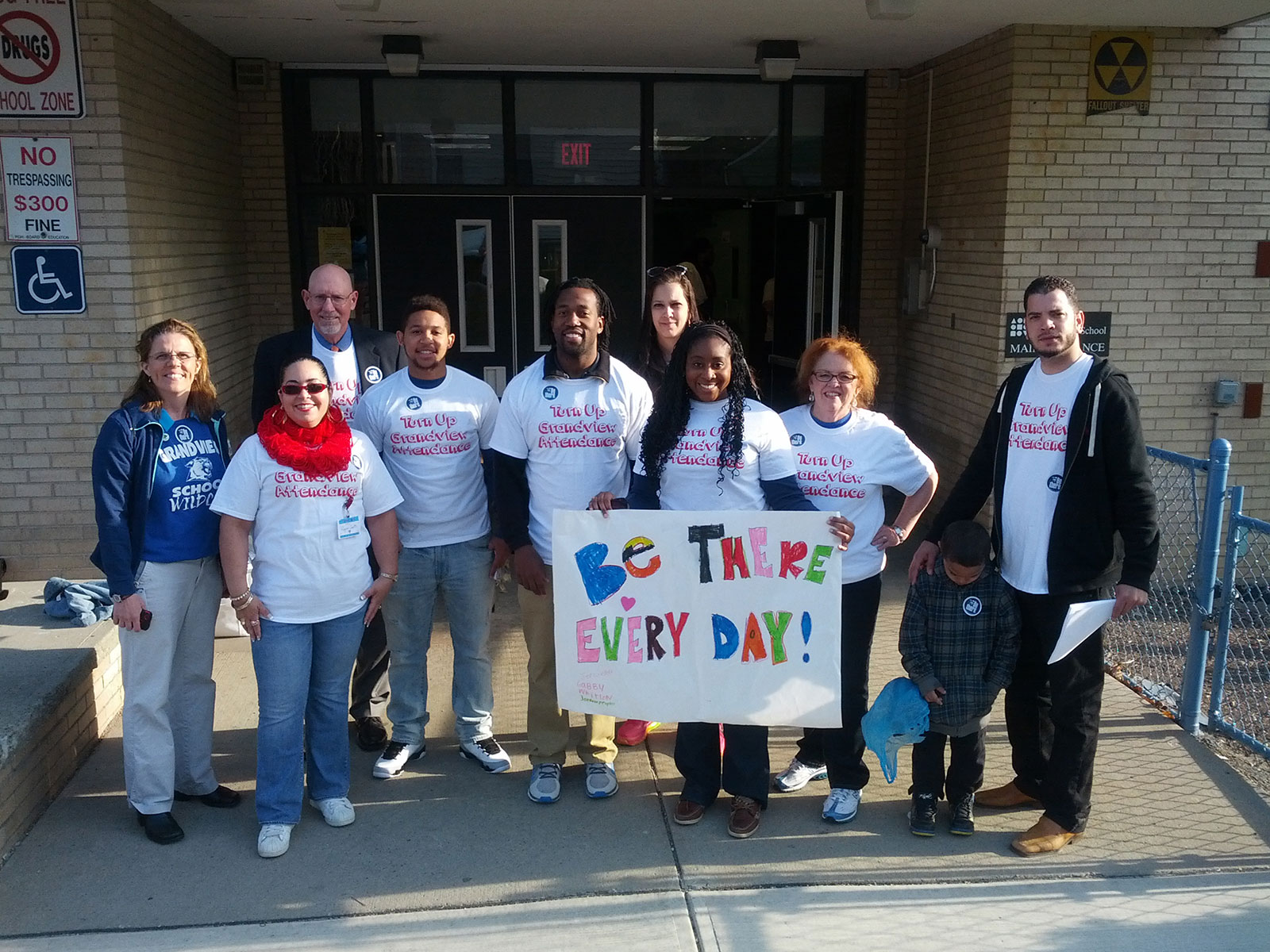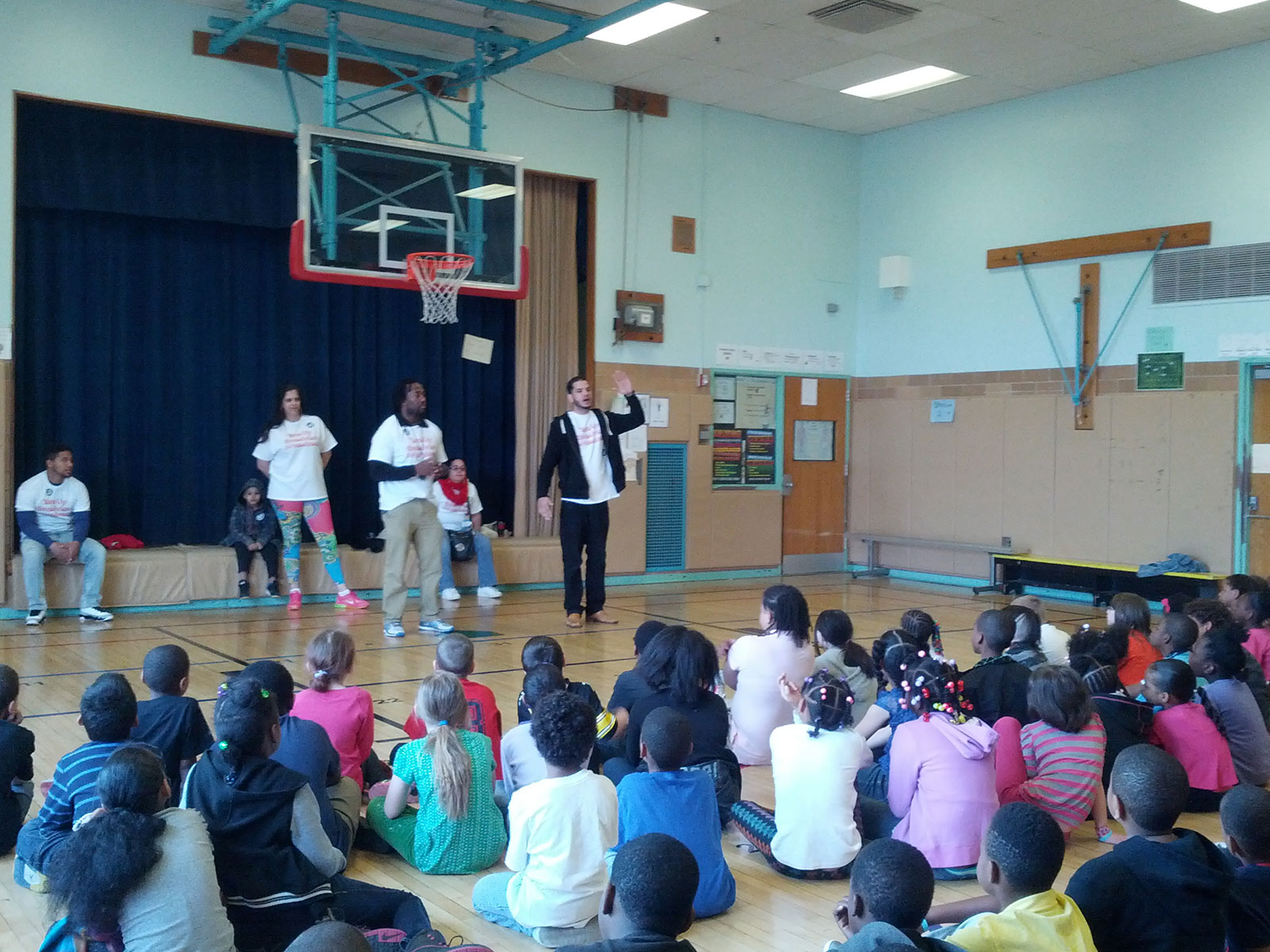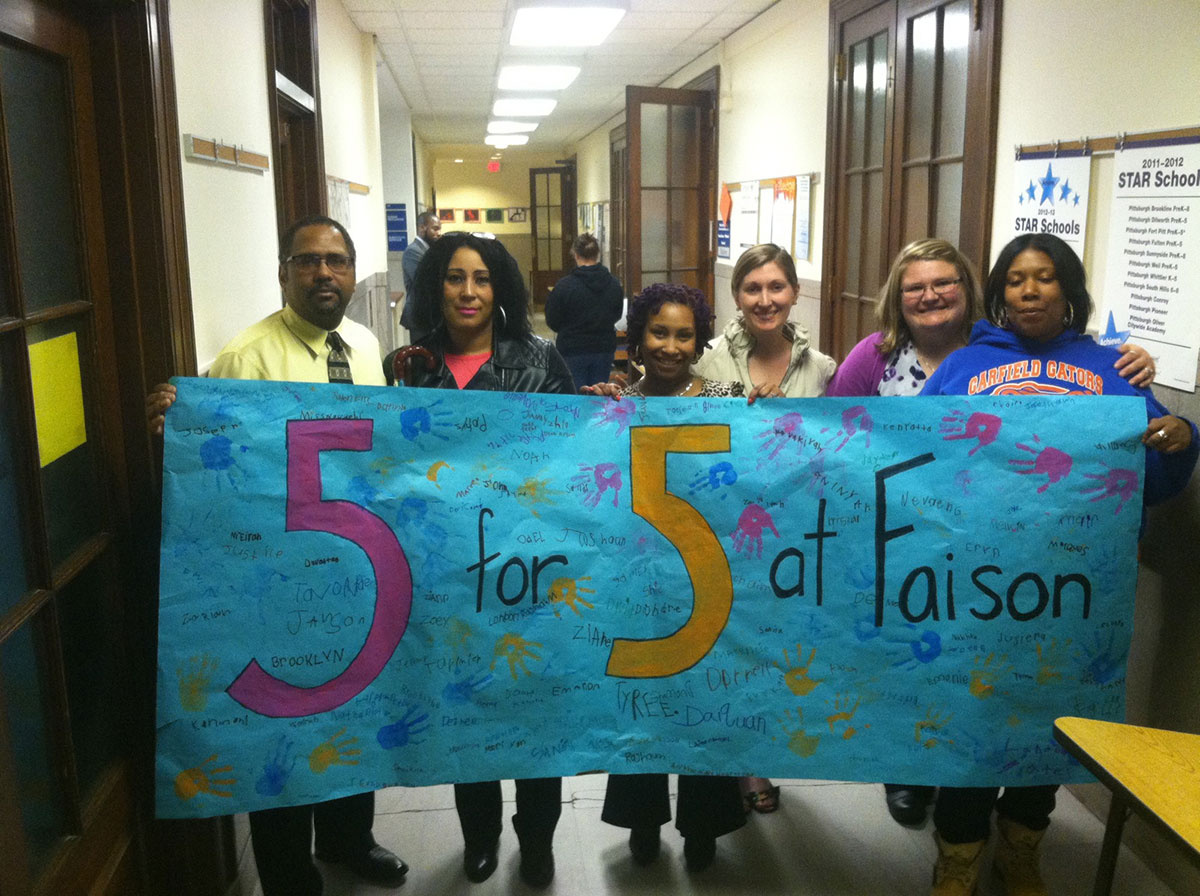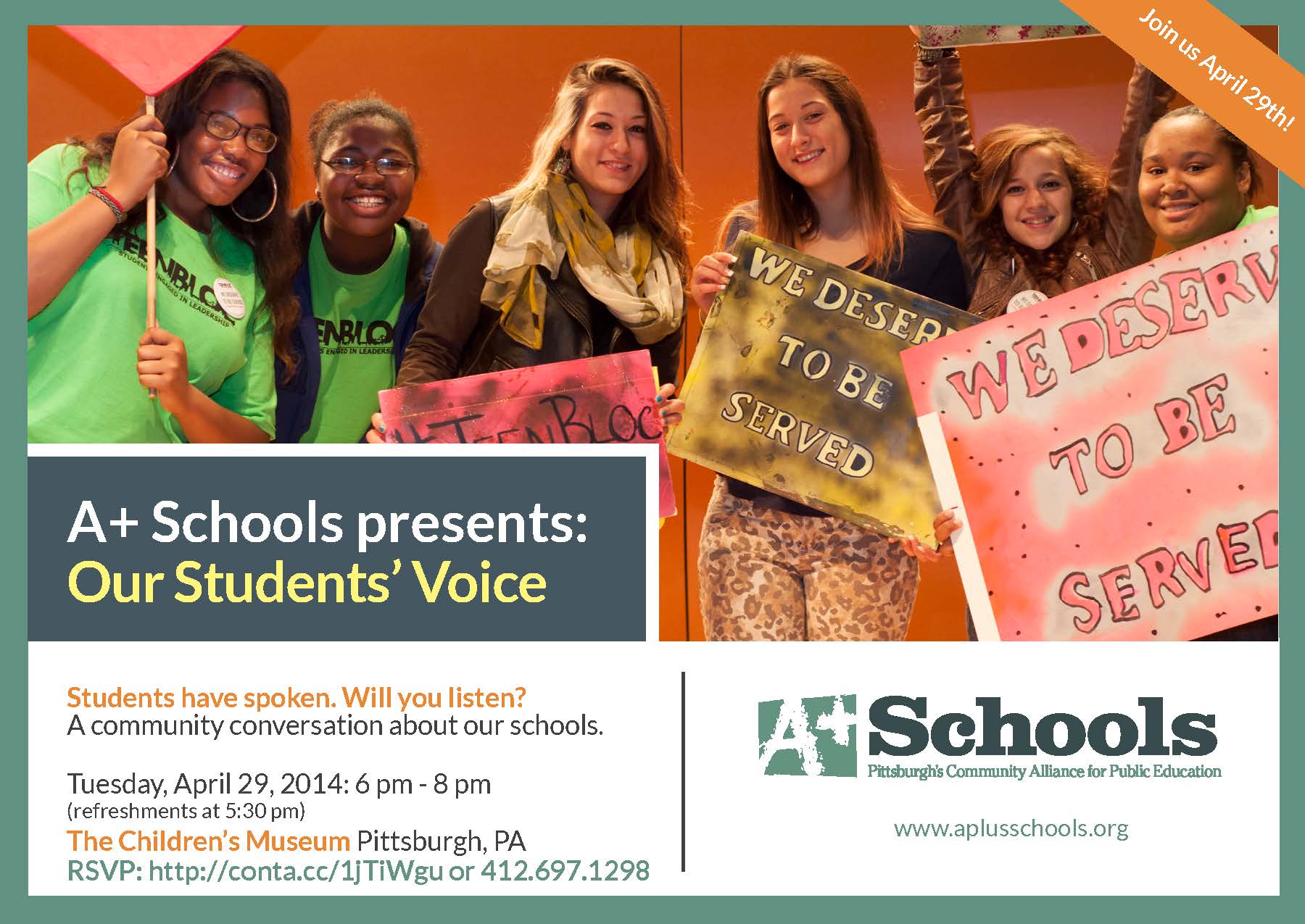Carey Harris, Executive Director, A+ Schools
Q&A with Carey Harris
By Courtney Tolmer
Endowments Communications Assistant
Since 2004, A+ Schools has served as a community force, advocating for the highest educational achievement of every student in Pittsburgh Public Schools. Executive Director Carey Harris describes how the organization has made an impact on local schools through the empowerment of students and parents.
Q: What was your organization’s biggest triumph of the past year?
A: Our TeenBloc youth leadership and development program has had a string of successes. The purpose of the program is to raise the student voice and create positive change. TeenBloc members, who include students in grades 9-12, were looking for a way to express their need for fair treatment, which included the right to equitable academic resources, a safe and positive school climate, the right to efficient transportation, and the right to be treated with dignity and respect by the school community. Putting their ideas into action, the teens in the program have developed a Student Bill of Rights with the input of more than 100 of their peers. They then got that Bill of Rights ratified by more than 1,700 other Pittsburgh public school students. They are currently in the process of getting the Bill of Rights approved by the Board of Education. While it’s not yet passed, our youth leaders have shown an exceptional amount of organizational talent, and we’re extremely proud of their efforts.
Q: What was the biggest trial?
A: We were surprised when the teachers’ union, the American Federation of Teachers, decided to make Pittsburgh ground zero in a national fight against high-quality, high-standard teacher evaluation. The Pittsburgh Public School District and the local teachers’ union had worked together over the past five years to build a new teaching system, which included a new evaluation system in the hopes of providing better feedback and differentiation among teachers in regards to their performance. The old system simply indicated whether the teachers were satisfactory or unsatisfactory without telling them how this was calculated. This was not helpful, accurate or motivating. The new system now separates teachers into categories: distinguished, sufficient, struggling and failing.
These categories are based upon student feedback, principal evaluation and student outcomes. Feedback comes at all levels of the scale so that teachers always know what they need to do to get better and strive for excellence. This is what we want the teachers to do. It is what we want the students to do. School and union officials disagree over where the ranges have been set for the teacher recognition scale. We have had to marshal resources, pull together coalitions and build community understanding around what the new teacher evaluation system that was built by and for Pittsburgh teachers can do, and why it’s a critical reform for our students.
Although the school district and the union disagree on the ranges, they do agree that the new system is much better than what was in place. We are optimistic that this will be resolved, but there is still a great deal of work to be done to get over this current impasse. This is a work in progress.
Q: What issue or event has had the most impact – positive or negative – on your organization in the past year and how have you responded?
A: The issue we just spoke of: this past year’s challenge to the teaching effectiveness work that began with such promise and with the collaboration of all stakeholders. It’s a challenge, though, that has focused us and made us a stronger organization.
Q: What new initiatives have been started?
A: During the past year, we’ve built eight school teams with parents in the district’s most vulnerable schools through our Parent Nation program. These teams have advocated for improvements, ranging from better transportation options for students at one school to the creation of a parent resource center and volunteer program in another. Parent Nation was started thanks to funding by The Heinz Endowments and other charitable organizations in our region. We were able to organize parents and give them materials to help build skills on how to help their children and their schools. We find that when parents are involved in their child’s school, good things happen. We want every parent and student to have hope and to feel powerful. If there is a challenge to overcome, we want the parents to feel that they can have a positive impact and can make change happen.
Q: As head of this organization, what goals do you have for it next year?
A: In the next year, I’m looking forward to seeing us expand the conversation across a variety of communities about what an excellent and equitable education should look like for our children. We want Pittsburgh to be a place where there is shared understanding about what can work in schools, and there is the will to do it. We believe we can help provide this by supporting increased parent advocacy in our most vulnerable schools through our Parent Nation program and by expanding knowledge of what’s happening in our schools through student leaders in TeenBloc.
Q: So if your organization were a person, what type of personality would you say it had?
A: Rational and passionate. Calm but tenacious. Everyone who works here or is on the board has a real passion – a fire in the belly – for kids and for education as a social justice. We may look calm and professional on the exterior, but we have a fire inside, and we won’t give up until we have achieved our goals. We don’t let our emotions get the best of us, and we stay rational by being committed to data and evidence. We try to understand the issues we are facing from as many different angles as we can, and after looking at all of the data, then we decide the best plan of attack. We can then put all of our passion into executing our plan.
Q: What’s one of the biggest misconceptions about your organization?
A: I think that depends on who you ask. Our goal is to be completely transparent about who we are and what we stand for. We fight for equity and excellence in our public schools. We make no apologies for backing policies and practices that research tells us will make a difference for our most vulnerable students. We try to provide good information to the public to challenge assumptions and create high expectations for our schools.
Q: Can you share a short story about an incident or event that illustrates the impact you believe your organization is having on your local community or the region?
A: Two years ago, the Pittsburgh Public Schools was staring down a huge budget deficit and was looking to make cuts. We knew that these cuts could not be done on the backs of our most vulnerable children. We engaged a financial expert to provide an independent analysis of the district’s financial situation for us, which we later summarized in a budget brief. We also held multiple community meetings in the district to better inform the public of the financial issues and to start to build some consensus about how things should change.
We took what we learned in these initial meetings out on the road and held additional conversations in communities from Garfield to Northview Heights to Carrick. We wanted to get the broadest possible input and provide some concrete recommendations for the board. We saw that too many schools didn’t have access to the things that help make a school a rich and wonderful place to learn: libraries, arts and music courses, advanced courses and languages in our high schools. Because of our advocacy for equitable school budgets and the commitment of the administration to improving equity, those things changed. Now every school has an open library. Every school has arts, music, languages and advanced courses. This is what we’re about. Focusing on increasing equity, and building community support for it.
Q: Could you share a short story about an individual’s experience that captures what your organization is meant to be to the community?
A: As an advocate for equity and excellence in our public schools, we try to empower individuals with information, resources and training so they can be champions for change. One of our TeenBloc students is just such a leader. Starting with a summer internship last year, Amma has been the driving force behind our TeenBloc Student Bill of Rights. Not only has she helped organize and plan the campaign that has garnered overwhelming support among her fellow students, she has been an inspiring speaker to adults and school board members about the issues embodied in the Bill of Rights. Whether it’s speaking out for the need for a right for student free speech to be recognized or demanding great teaching and learning environments in our high schools, Amma has been an inspiration to us and an embodiment of what we hope our work will do in the community.
